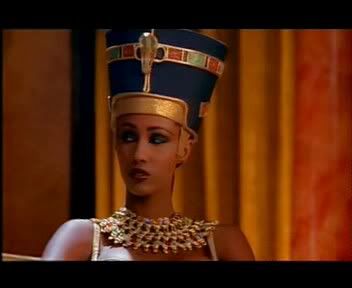Alas, I cannot make that play on my machine, which is unfortunate. I have listened to Hawass in other contexts, however, and am assuming that your audio clip is consistent with the rest of his statments.
Now, Hawass was, until very recently the Minister of State for Antiquities Affairs in Egypt which gives him a formal blessing by The Government (which, as we all know, has undergone some abrupt changes recently) but he is also a somewhat controversial figure and not all of his views are universally held. (paragraph largely provided for anyone lurking who is not up to speed on these matters, I assume the thread participants known who Hawass is.)
If you listen to Hawass he claims that Ancient Egyptian civilization was unique from any other culture in history with no surrounding influence. While certainly Ancient Egypt was unique it obviously had cultural roots outside of the Nile Valley. That is where African scholars would disagree with Hawass.
That's where not just African scholars but a lot of other people would disagree with him. The evidence is overwhelming that the Egyptians did not live in an isolated bubble.
Of course, this is the guy who throws a hissy fit if someone suggests Tutankhamun was black. It's a legitimate question, especially as it is known unequivocally that at least
some Egyptians, including some of their pharoahs, were from points south such as Nubia, or, as it was known back then, Kush. He also opposes using DNA analysis on mummies - personally, I think he's afraid that it will refute some of his pet theories - despite recent advances in the technology and its use in other fields.
I think some of his stance on Egypt being so unique and isolated stems from two forms of bigotry - he doesn't want to be identified with the darker peoples in Africa (where, exactly, he gets that I'm not sure but it's hardly an uncommon prejudice) and he's definitely an anti-Semite. If Egyptians aren't unique unto themselves, what are the two most likely influences on them? Those darker southern peoples, and the Semitic people to the east. Oh, horrors! Egyptians
might be related to
blacks and Jews!!!!! Well, if they are, so what?
On the other hand, the man is driven to preserve Egyptian artifacts. Supposedly, looting and tomb robbing has dropped significantly under his tenure. Granted, the European museums are unlikely to return the artifacts looted in the 19th Century but Hawass does have a point that those objects are Egyptian and were most likely removed without any official permission, i.e. looted or stolen.
The origins of Egyptian ethnicity lay in the areas south of Egypt. The ancient Egyptian language belonged to the Afrasian family (also called Afroasiatic or, formerly, Hamito-Semitic).
In case anyone is unclear on the history of that language family - It was coined in the 19th Century and has definite roots in scientific racism. "Semitic", of course, is often used as a synonym for "Jewish" (although many semitic peoples aren't and never have been Jewish - Akkadians, Canaanites, Phoenicians, Arabs, and Ethiopians among others). "Hamitic" is less well known to the general public, but it refers to one of the Biblical sons of Noah (Semetic is also of the same etymology) who was "cursed" and his descendants were to be the "servants of servants". Under the Biblical "history" Ham's sons founded Canaan, Egypt, Cush, and Libya, and supposedly they were also cursed with dark skin (but note this would still set them apart from other dark-skinned Africans, and let's just forget the Canaanites and Libyans were probably lighter than the Egyptians and Cushites/Kushites/Nubians). This just-so story was used to, among other things, justify enslaving the dark-skinned of Africa. It was also used to explain away the achievements of Africans - it was all done by those "real people" who were "cursed" to look like those dark people, but not really done by those dark people. Any accomplishment by "true negroes" was dismissed as actually being a Hamitic achievement.
So... a "Hamito-Semitic" language family is basically "what those blacks and Jews speak" dressed up to look respectable, and the grouping is based in Biblical mythology and not real history. Which might be why, in the 20th Century, it was found that the 19th Century group of languages called Hamito-Semitic weren't, actually, a valid grouping as it included languages that were unrelated to the core group.
Hence, "Afroasiatic" these days, which is not racially loaded, is not based on mythology, and the name of which refers to the geography of the language family, straddling part of Africa and part of Asia. My only issue with it are those people who don't read past the first four letters of the name and forget that it does, yes, include territory outside of Africa. The people living in that region 5,0000-10,000 years ago did not have our knowledge of geography and didn't call half that territory "Africa" and the other half "Asia", to them it was all part of the world. It is a distinction we make, not one they made.
Thus, I argue that to deny
all connection to Asia (more specifically, the Middle East) is as much a distortion as to deny all connection to Africa. The truth is not served by going from one extreme to another.
I will say, though, that the older I get the more offensive the term "Hamito-Semitic" becomes. Unfortunately, because the term became so entrenched and so many people learned it as part of history we'll still have to suffer terms like "Afroasiatic, (formerly Hamito-Semitic)" so people educated a generation ago will know what the hell is being discussed.
And, of course, since recent scholarship puts most of this language family squarely in Africa is
does get the white racists pissed off - instead of their favored group marching into Africa to give civilization to the "darkies" it sure starts to look like those "darkies" gave quite a bit to the folks in the Middle East, that the flow of civilization and ideas might have gone the other way from what was asserted in the 19th Century.
Which is why "what color were the Ancient Egyptians" is such a powder keg - it's not really about the Egyptians, it's about racial prejudices. Otherwise, we'd all agree on "brown" and have polite discussions over tea and scones on the particular shades of brown concerned then move on discussing hairstyles as portrayed on tomb wall paintings.
The first elements of Egyptian culture were laid down two thousand years later, between 12,000 and 10,000 B.C., when some of these Afrasian communities expanded northward into Egypt, bringing with them a language directly ancestral to ancient Egyptian. They also introduced to Egypt the idea of using wild grains as food.
I'm curious - what grains are referred to there? My understanding is that native African grains are things like millet and sorghum, which certainly can form a solid basis for agriculture - indeed, these are major grains in the sub-Saharan region of Africa to this day. However, it is also my understanding that wheat and barley were of Middle Easter/Levant/Anatolia origin (that's where they grow wild). Thus, is this suggesting that the Egyptians had a native agriculture based on grains such as millet and sorghum, then imported wheat and barley from the Levant (as they did goats) and incorporated it into their already existing agricultural systems?
And as Biblical scholars have shown, Yahweh, god of the ancient Hebrews, an Afrasian people of the Semitic group, was originally also such a deity.
And...
that statement is certain to piss of some of the ignorant Jews who will be mightily offended at the notion of being African. Of course, real history is full of facts that piss people off. And many Jews of European descent get very huffy when confronted with Jews who look different than them (Jews went all over the old world, including as far as China, where, not surprisingly they intermarried with locals sufficiently to start looking Chinese). DNA studies are confirming that many of these folks' oral histories are true - they
are of Jewish descent with ancestry reaching back to the Middle East, even if they don't look like stereotypical Jews.
As I mentioned in a prior post, if the Jews
did spend significant time in Egypt, as the Bible recounts, then they no doubt did some "intermingling" (whether voluntary or forced) and came to resemble the Egyptians to some degree. Thus, if the Egyptians are black Africans then by extension every Jew is part black African. It is understandable that, in the 19th Century where "one drop" rules meant
any black African ancestry made one black, and thus subject to second class status and severe restrictions if not outright slavery, Jews strenuously resisted such a notion. It's not like they were well liked anyhow. These fears have carried over into the present day for some, though more enlightened people have recognized the kinship of black African Jews to other Jews worldwide.
Again, it's back to skin color being a volatile subject in the modern world, and an illustration how modern issues can lead to bias in scholarly research and theories.
The connection of many of Egypt's predynastic gods to particular localities is surely a modified version of this early Afrasian belief. Political unification in the late fourth millennium brought the Egyptian deities together in a new polytheistic system. But their local origins remain amply apparent in the records that have come down to us.
This has been known for a long time - I remember this sort of thing even back in the 1970's when I first became interested in Ancient civilizations. Almost every text noted alternate names and spellings for Egyptian deities and the localized nature of practice. It's polytheistic in that there are many gods, but there's that conflation of many localized deities into one "national" level one or holding that all those local gods are just "aspects" of the larger god.
I've never been quite sure if that reading is a modern interpretation, or if the Ancient Egyptians saw it that way. I do know that how the Egyptians thought of religion was very different from how modern people do, so it's a little hard to get into their headspace. The Greeks and Romans tended to see foreign gods as their own on a certain level, even to the point of saying "God-so-and-so of that tribe over there is their name for Jupiter". Does that practice, which is well known, influence scholars view of ancient Egyptian religion? Of course, Roman adoption of the cult of Isis just further confuses things - the Romans were not adverse to adopting other peoples' gods. That does not, of course, mean that Roman era worship of Isis was the same as Egyptian worship of Isis in the Old Kingdoms.
One major technological advance, pottery-making, was also initiated as early as 9000 B.C. by the Nilo-Saharans and Afrasians who lived to the south of Egypt. Soon thereafter, pots spread to Egyptian sites, almost 2,000 years before the first pottery was made in the Middle East.
This, of course, is one of the things that piss off those who are emotionally invested in the idea that the Levant was the origin of civilization - proof that the Africans were quite inventive in their own right.
But several notable early Egyptian crops came from Sudanic agriculture, independently invented between 7500 and 6000 B.C. by the Nilo-Saharan peoples (Ehret 1993:104-125). One such cultivated crop was the edible gourd. The botanical evidence is confirmed in this case by linguistics: Egyptian bdt, or "bed of gourds" (Late Egyptian bdt, "gourd; cucumber"), is a borrowing of the Nilo-Saharan word *bud, "edible gourd." Other early Egyptian crops of Sudanic origin included watermelons and castor beans. (To learn more on how historians use linguistic evidence, see note at end of this article.)
Just a point here - the "edible gourd" referred to here is the plant family Cucurbitaceae which encompasses gourds, squashes and melons. More and more, the evidence is pointing towards ALL of them originating in sub-Saharan Africa. The reason things like cucumbers, squash, and melons grow all over the world is because humans domesticated them early and carried them on their migrations. The people who first domesticated them were sub-Saharan Africans.
I'm always surprised the Afrocentrists don't bring this up more often as a very
clear example of African origin for a significant contribution to agriculture and as a clear example of knowledge/items diffusing from Africa to everyone else in the world. Maybe cucumbers and zucchini aren't as sexy as tombs full of dead kings or something.
One key feature of classical Egyptian political culture, usually assumed to have begun in Egypt, also shows strong links to the southern influences of this period. We refer here to a particular kind of sacral chiefship that entailed, in its earliest versions, the sending of servants into the afterlife along with the deceased chief. The deep roots and wide occurrence of this custom among peoples who spoke Eastern Sahelian languages strongly imply that sacral chiefship began not as a specifically Egyptian invention, but instead as a widely shared development of the Middle Nile Culture Area.
My only quibble with this is the fact that such "sacral kingship", complete with dispatching living humans to the afterlife to serve him, is not limited to Africa - we see it in plenty of other places, too. So while it is indicative of a link it's not solid proof, as "sacral kingship" apparently can arise independently in human groups with ease.
Broomstick wrote:I'd find it odd if her family hadn't "intermingled" with the natives. The Ancient world didn't have many of our modern day cultural taboos against inter-ethnic marriages (which, honestly, have faded significantly during the latter half of the 20th Century) and marrying the native royalty/aristocrats has long been a way for conquerors to legitimize their claims to the throne.
According to Mary Lefkowitz the Ptolmaic Dynasty was very culturally xenophobic except when it came to adopting the traditions of the Pharaohs and that they had little contact with the Egyptian populace as well as practiced an incestuous mating to keep the royal bloodline pure. This is the basis for the idea that the Ptolemies and therefore Cleopatra had purely Macedonian heritage.
There's evidence that pharoahs
always tended to be apart from the general population, with little contact, and practiced incest to keep the bloodline "pure". However, lines that actually practiced that to an extreme invariably died out (usually after a couple generations of only daughters being born). In practice, there were usualy bastards and half siblings, products of concubines and junior wives, that brought a trickle of outside genes into the family. If the Ptolemies did marry any of the native aristocracy upon arrival in Egypt, well, that explains that "mixed heritage" thing, and certainly establishing a family connection to the prior ruling regime would help them cement their claim - as I said, it's a common thing for incoming foreign rulers to do throughout history.
This is actually taught in some colleges. My Western Civilization professor told us that Cleopatra did not have a drop of Egyptian blood. I found this revelation for that documentary on Arsinoe to be interesting because of conventional thinking on the issue.
Yes, but I remember that also being refuted decades ago, on the basis of what I mentioned above - new conquerors marrying into the local royals/nobles, and long term incest not working out so well. Granted Cleopatra's family
did apparently suffer from incest-related problems, so there's little dispute that they practiced that custom, but if they did, why not the custom of marrying some of the locals of high rank from time to time?
I do not think Cleopatra VII herself was a dark-skinned women of mostly African descent however the idea of her and her family being purely European may be exaggerated.
Almost certainly she wasn't "pure" European - yet I agree she wasn't mostly African. I've known some of my local Afrocentrists to assert she WAS a black person. In this case, the evidence would seem to indicate that she likely was mostly of Greek descent and accordingly would probably "look Greek" for the most part.











